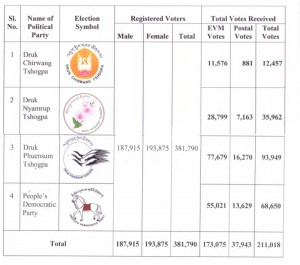Bhutan Goes through Primary Round of National Elections: Update No.97
By Dr. S.Chandrasekharan.

It should be no surprise that Bhutan went through the primary round of second National Elections on 29th May, without any major incident relating to law and order or any major violation of the election code.
Credit for the smooth conduct of the elections should not only go to the Interim government under the Chief Justice but also to the the four political parties that participated in the elections. A word of praise for Gyalpo 4 who I am sure is still guiding the country in his retirement, is also due!
Some observations on the elections, pre and post election scenarios and the results will include the following.
1. Of the 381, 790 registered voters- 211,018 voted and this comes to over 55 percent. This percentage in my view is rather low considering the enthusiasm generated by the parties in the pre elections campaign. It is said that there were heavy rains on that day preventing many in the remote regions to reach the polling booths- but this does not explain the whole story.
2. Surprisingly, less than half of the eligible youth voted in the elections. Were they disenchanted or were they marginalised in the last five years of government of the DPT government? Unemployment or lack of good economic opportunities could be one good reason. Any future programme under the GNH should focus on the youths more.
3. The DPT that ruled the country in the last five years obtained a total of 93,949-won in 33 of the 47 constituencies. It is a creditable performance given the rupee crunch, sluggish economy and some deliberate, malicious and unverified accusations by anonymous people before elections. They do not seem to have done well in the urban areas. There is an indirect admission by former prime minister JYT ( Jigmi. Y. Thinley) in one of the election meetings for the final round of having ignored the urban areas. He said that the first five years were focussed on uplifting the lives of those living in rural areas and in the next five years the focus will be on urban areas.
4.The DPT under JYT is still a formidable force for the coming final round of elections due on July 13- a run off between DPT and the PDP. Yet one notices that DPT is jittery! The party had a “free run” in the last five years with 45 of the 47 parliamentarians from their party. The opposition- the PDP had only two and is certainly likely to improve its position and may even pose a challenge in many constituencies. Yet for the DPT to accuse PDP of trying for a coalition with the two losing parties DCT and DNT when seven of DNT have joined the PDP for contesting the elections is rather unfair. The DPT is perhaps complaining “too much”.
5. The PDP secured 68,650 votes and won in 12 constituencies. It did not do well in eastern and central Bhutan, but showed considerable strength in south west and central west in Bhutan. They should be doing well in the final round and it is in the interest of future of democracy that the second party has sufficient strength in the new assembly unlike the earlier one when it had only two seats.
6.The performance of two other parties the DNT and the DCT cannot be considered as poor. The former won in two constituencies while the other did not win in any. Considering the short time they had in campaigning and being fairly new to the election field they have done well. It is heard that the DNT will be losing its President and its Vice President for contesting in the final round under the banner of the PDP. This kind of ‘cross over’ is provided for in the constitution and should be welcome.
7. There were very few complaints of violation of code of conduct in the elections. There was one serious complaint by the PDP coordinator of Serthi Gewog against the DPT candidate of bribing the voters. It turned out that the person responsible wanted to distribute ‘used surplus clothes’ to the needy rather than throwing them away! . Yet the complaint was “seriously” investigated. In another instance a candidate was supposed to have provided food for 500 of his villagers!
8. All the parties without exception promised too many benefits once they are voted to power. An article in the media collected all the points given in their manifestos and showed how it is not possible to implement most of the ‘promises’ being made by the parties. This tendency has to be curbed and I am sure the authorities can do it. One of the points made by the leading party DPT appeared to be most ambitious. It said that it would finance 25 percent of capital expenditure in the eleventh plan from its own domestic resources. This is not doable and there is no money either. The point is, that people should not be misguided by such tall promises and the party that comes to power on such promises should be made “accountable”.
The election was lively and generally devoid of acrimony. The final round due on July 13 is also expected to be smooth. It is heartening to see that democracy is taking deep roots in the country.
Source: SAAG